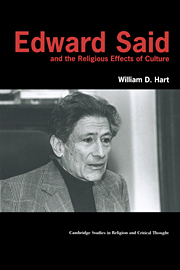Book contents
- Frontmatter
- Contents
- Preface
- Abbreviations
- Preliminary remarks
- 1 Culture as the transfiguration of religious thought
- 2 The religious effects of culture: nationalism
- 3 The religious effects of culture: Orientalism
- 4 The religious effects of culture: imperialism
- 5 The responsibilities of the secular critic
- 6 Marx, Said, and the Jewish question
- Concluding remarks: religion, secularism, and pragmatic naturalism
- Appendix A Whose exodus, which interpretation?
- Appendix B An exchange of letters between Michael Walzer and Edward Said
- Notes
- Select bibliography
- Index of names
3 - The religious effects of culture: Orientalism
Published online by Cambridge University Press: 22 September 2009
- Frontmatter
- Contents
- Preface
- Abbreviations
- Preliminary remarks
- 1 Culture as the transfiguration of religious thought
- 2 The religious effects of culture: nationalism
- 3 The religious effects of culture: Orientalism
- 4 The religious effects of culture: imperialism
- 5 The responsibilities of the secular critic
- 6 Marx, Said, and the Jewish question
- Concluding remarks: religion, secularism, and pragmatic naturalism
- Appendix A Whose exodus, which interpretation?
- Appendix B An exchange of letters between Michael Walzer and Edward Said
- Notes
- Select bibliography
- Index of names
Summary
It is quite clear which color is a hundred times more important for a genealogist than blue: namely grey, which is to say, that which can be documented, which can actually be confirmed and has actually existed, in short, the whole, long, hard–to–decipher hieroglyphic script of man's moral past!
(Friedrich Nietzsche, The Genealogy of Morality, pp. 8–9)Genealogy does not oppose itself to history as the lofty and profound gaze of the philosopher might compare to the molelike perspective of the scholar; on the contrary, it rejects the metahistorical deployment of ideal significations and indefinite teleologies. It opposes itself to the search for “origins.”
(Michel Foucault, Language, Counter-Memory, Practice, p. 140)I have found it useful here to employ Michel Foucault's notion of a discourse, as described by him in The Archaeology of Knowledge and in Discipline and Punish, to identify Orientalism. My contention is that without examining Orientalism as a discourse one cannot possibly understand the enormously systematic discipline by which European culture was able to manage – and even produce – the Orient politically, sociologically, militarily, ideologically, scientifically, and imaginatively during the post-Enlightenment period.
(Edward Said, Orientalism, p. 3)- Type
- Chapter
- Information
- Edward Said and the Religious Effects of Culture , pp. 62 - 87Publisher: Cambridge University PressPrint publication year: 2000

